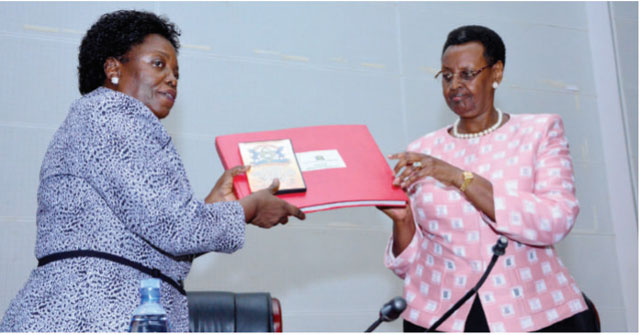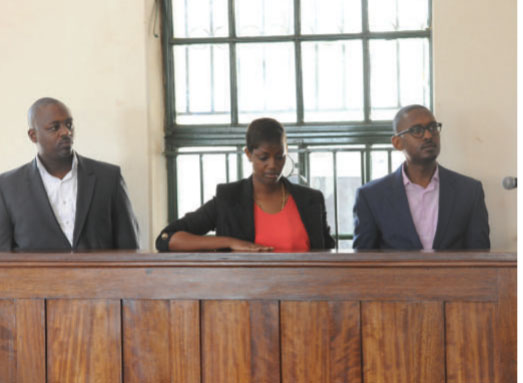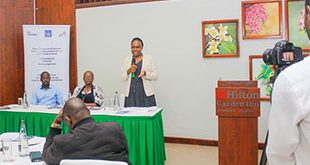
minister Janet Museveni on Jan 31 at the Presidents offices. INDEPENDENT/JIMMY SIYA
Cram work noted as UCE results are released
Results of the 2016 Uganda Certificate of Education (UCE) results were released on Jan.31 indicating a failure rate of 13.2%. UNEB Executive Secretary Daniel Nokrach Odongo noted that many students had difficulties writing correct spelling of words and tenses while answering questions. In especially English, Odongo said students couldn’t use correct grammar and punctuation in compositions and that there was cramming of passages as well as spotting. Overall, of the 323,276 candidates that registered, 316,624 sat the final exams where 23489 (7.5%) passed in division one, 44,307 (14.1%) in division two, 63072 (20.1%) in division three, 142,479 (45.3%) in division four and 41632 (13.2%) in division nine.
Also, more failures were seen in science subjects compared to arts although biology was done better than the previous year. The continuous poor performance is attributed to teaching science subjects theoretically something partly blamed on the fact that some schools have no equipment for practical lessons.
Overall, with a failure rate of 13.2% this year compared to 9.7% in 2015, performance declined.
Committee asks for additional Shs451billion environment sector
To tackle issues of water scarcity, environmental degradation and effects of climate change, the parliamentary Budget Committee has recommended that additional Shs451.247billion be allocated to the water and environment sector in the new financial year. The sector has been according to the National Budget Frame Work Paper (NBFP) allocated Shs742.73billion yet to avoid being water scarce, members of parliament say the sector requires Shs1.194 to achieve the National Development Plan targets of 79% access to safe water in rural areas and 100% access in urban areas by 2020.
According to the committee report released on Jan.31, members recommended that district environment inspection committees be made operational in order to curb on illegal activities like sand mining that is mostly done at night. However, NEMA has a funding gap of Shs29 billion of which Shs14.5billion is meant to support decentralized environment management functions at district level.
URA board denies being consulted on bonus payment
In the continuing inquiry into the payment of Shs6billion oil case bonus to public servants involved in the legal battle between government and Heritage Oil company, the committee on Commission, State Authorities and State Enterprises (COSASE) headed by Chairman Abdu Katuntu on Jan.30 heard the Uganda Revenue Authority Board Members. When asked about the role they played in asking for the handshake, board chairman Simon Kagugube said he had just seen a letter from the Ministry of Finance authorizing the payment and that the issue was only brought to their attention recently when it appeared in the press.
With this submission, Katuntu asked him whether it was proper for the commissioner General Doris Akol who is also the initiator of the handshake to pay out money without consulting the board a thing she quickly defended that it wasn’t an irregular move because it didn’t relate to the authority’s activities that the board monitors and that the Public Finance Management Act gives her a go ahead to make payments if they are already sanctioned by Finance Ministry.
Apart from URA, other civil servants from Ministry of Finance and Energy are expected to appear before the probe committee. 42 civil servants are said to have benefited from the handshake.
Perception report ranks Uganda high in corruption
Transparency International a global NGO that tracks corruption levels among countries released its Global Corruption Perceptions Index 2016 on Jan 25. Uganda ranked 151 of the 176 countries surveyed dropping 12 places from its 2015 position. Analysts say Uganda’s bad ranking is largely based on the fact that the country has failed to effectively prosecute corrupt public officials and failed to protect those who speak against the vice resulting into intimidation of the would be corruption fighters.
According to a statement by Jose Ugaz, the chairman of the NGO that conducts these surveys annually said this year, the results show a connection between corruption and inequality.“In too many countries, people are deprived of their most basic needs and go to bed hungry every night because of corruption, while the powerful and corrupt enjoy lavish lifestyles with impunity,” he said adding that the interplay of corruption and inequality also feeds populism whereby when traditional politicians fail to tackle corruption, people grow cynical and they increasingly turn to populist leaders who promise to break the cycle of corruption and privilege.
The report shows Somalia is perceived to be the most corrupt country followed by South Sudan.

The Kanyamunyus to be tried in high court
Mathew Kanyamunyu his brother Joseph Kanyamunyu and girl friend Cynthia Munwangari were on Jan.31 committed to high court for trial by the Nakawa Grade one Magistrate Noah Ssajabbi on directions by the Directorate of Public Prosecutions (DPP). State Prosecutor Doreen Erima told court that investigations in the case were complete and that the file should be sent to High Court.While Mathew and Munwangari are accused of murder for shooting a social worker in November, Joseph is accused of a second offence of picking and hiding the pistol used in committing the crime.
 The Independent Uganda: You get the Truth we Pay the Price
The Independent Uganda: You get the Truth we Pay the Price



